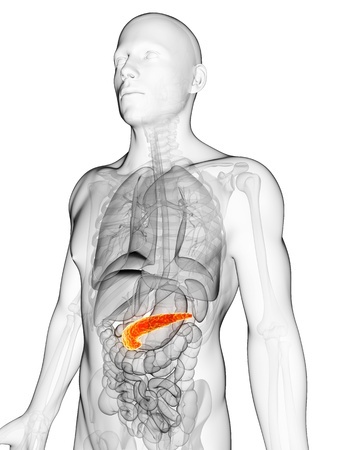Byetta Pancreatitis

Byetta, an injectable Type 2 diabetes medication, may be associated with an increased risk of pancreatitis. Hundreds of people who allegedly developed this potentially-deadly condition due to their use of Byetta are now pursuing lawsuits against the drug’s manufacturer.
Byetta Lawsuit Evaluations
The nationwide law firm of Bernstein Liebhard LLP is now evaluating potential Byetta lawsuits on behalf of patients who were diagnosed with acute pancreatitis while using this medication. To learn more, please contact our office by calling (888) 994-5118.
What is Pancreatitis?
Pancreatitis is an inflammation of the pancreas. The condition occurs when digestive enzymes are activated before they are released into the small intestine and begin attacking the pancreas. The disorder may take on one of several presentations:
- Acute Pancreatitis: Occurs suddenly, causing pain and swelling in the upper abdominal region that may radiate to the back.
- Chronic Pancreatitis: An inflammation of the pancreas that does not heal. It will get worse over time and lead to permanent damage. Untreated acute pancreatitis will result in chronic pancreatitis.
- Necrotizing Pancreatitis: A severe form of acute pancreatitis in which the tissue begins to die.
- Hemorrhagic Pancreatitis: An acute, potentially fatal inflammation of the pancreas characterized by bleeding, necrosis, and paralysis of the digestive tract.
Pancreatitis Symptoms
Symptoms associated with acute pancreatitis may include:
- Pain in the upper abdomen
- Abdominal pain that radiates to your back
- Abdominal pain that becomes worse after eating
- Nausea
- Vomiting
- Abdomen is tender to the touch
Chronic pancreatitis signs and symptoms include:
- Upper abdominal pain
- Unexplained weight loss
- Oily, smelly stools (steatorrhea)
FDA Warning on Byetta and Pancreatitis
- 2007: The U.S. Food & Drug Administration (FDA) revealed that it had reviewed 30 postmarketing reports of acute pancreatitis in patients taking Byetta. It is suspected that the use of Byetta was associated with some of these cases. The agency recommended that doctors instruct Byetta patients to seek prompt medical care if they experience unexplained persistent severe abdominal pain which may or may not be accompanied by vomiting. Byetta should be discontinued if pancreatitis is suspected.
- 2008: The FDA announced that an additional six cases of hemorrhagic or necrotizing pancreatitis in patients taking Byetta had been reported to its database. All patients required hospitalization, and two died. The agency also disclosed that it was working with Byetta’s manufacturer to add stronger and more prominent warnings in the product label about the risk of acute hemorrhagic or necrotizing pancreatitis.
- 2009: the FDA announced that it was requiring Byetta’s manufacturer to conduct six post-marketing studies in order to investigate a possible link between the medication and acute pancreatitis, including hemorrhagic and necrotizing pancreatitis, and to explore a possible association with thyroid cancer and pancreatic cancer
Studies Link Byetta to Increased Risk of Pancreatitis
- 2011: An analysis of adverse event reports submitted to the FDA between 2004 and 2009 published in the medical journal Gastroenterology suggested that Byetta was associated with a 3-fold risk of pancreatitis.
- 2013: According to an analysis published in JAMA Internal Medicine, Byetta may double a patient’s risk of developing pancreatitis. The study looked at data from1,200 diabetes patients who were hospitalized for pancreatitis and compared them to a group of diabetics who did not have the condition. Of the group with pancreatitis, 87 had filled a prescription for Byetta or another incretin mimetics.
Do I Qualify to File a Byetta Lawsuit?
Byetta patients may qualify to file a lawsuit if they were diagnosed with any form of pancreatitis while using this Type 2 diabetes medication. To obtain a free, no-obligation review of your case, please contact Bernstein Liebhard LLP today at (888) 994-5118.
- Mayo Clinic (2013) “Pancreatitis” http://www.mayoclinic.org/diseases-conditions/pancreatitis/basics/symptoms/con-20028421
- FDA (2007) “Information for Healthcare Professionals: Exenatide (marketed as Byetta” ) http://www.fda.gov/Drugs/DrugSafety/PostmarketDrugSafetyInformationforPatientsandProviders/ucm124713.htm
- FDA (2008) “Information for Healthcare Professionals: Exenatide (marketed as Byetta) – 8/2008 Update” http://www.fda.gov/Drugs/DrugSafety/PostmarketDrugSafetyInformationforPatientsandProviders/ucm124713.htm
- FDA (2009) “Byetta Safety Update for Healthcare Professionals” http://www.fda.gov/Drugs/DrugSafety/PostmarketDrugSafetyInformationforPatientsandProviders/DrugSafetyInformationforHeathcareProfessionals/ucm190406.htm
- Gastroenterology (2011) “Pancreatitis, Pancreatic, and Thyroid Cancer With Glucagon-Like Peptide-1–Based Therapies” http://www.gastrojournal.org/article/S0016-5085%2811%2900172-7/fulltext
- JAMA Internal Medicine (2013) “Glucagonlike Peptide 1–Based Therapies and Risk of Hospitalization for Acute Pancreatitis in Type 2 Diabetes Mellitus” http://archinte.jamanetwork.com/article.aspx?articleid=1656537
Get the latest news and litigation updates about this case by following us on Facebook. Click the "Like" button below.
Follow Us


